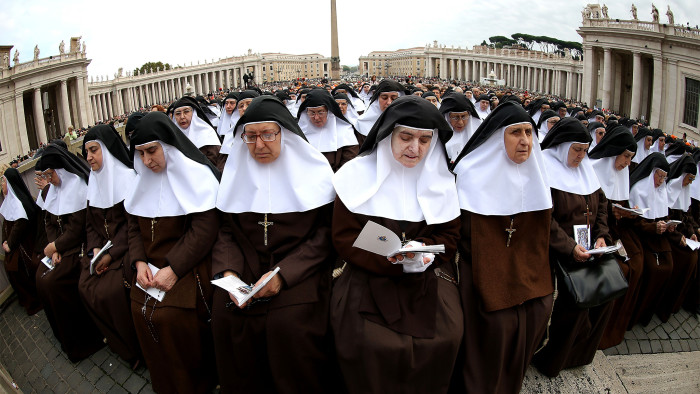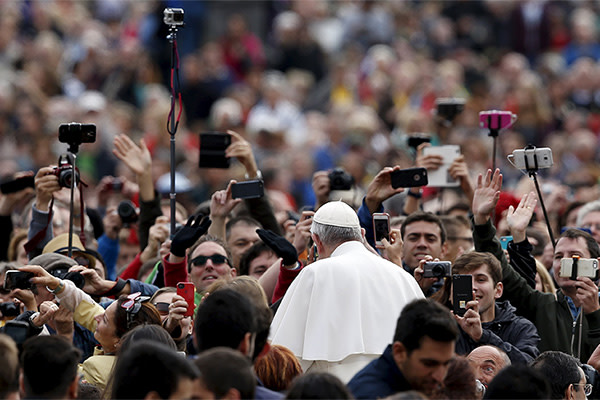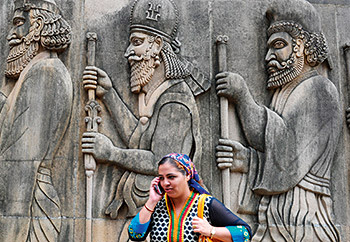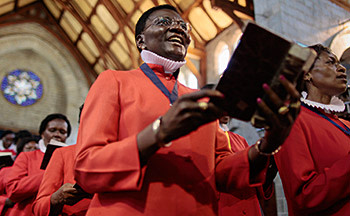Religion and the keys to survival

Roula Khalaf, Editor of the FT, selects her favourite stories in this weekly newsletter.
Premiering at the Venice International Film Festival in September was a documentary about the Vatican’s Swiss guards, the tiny army that has served as security to successive popes since 1506.
The revelation of The Smallest Army in the World, directed by Gianfranco Pannone, was not the pomp and ceremony of the world’s oldest institution, but the banality: daily toil marked by cramped meeting rooms, dull, repetitive tasks and hours spent waiting for the boss.
That the boss is Pope Francis — who in a lingering offstage pan-out is seen, visibly tired, walking away from a meet-and-greet with pilgrims — becomes almost secondary to the familiar everyday drama of coping inside a vast organisation.

For any business gurus looking for tips there was another message: organised religion — with the 2,000-year-old Roman Catholic Church in primis — is full of lessons for businesses seeking long-term survival.
Since Pope Francis was elected in March 2013 it has become popular to consider the Argentine pontiff as a turnaround chief executive at the world’s oldest multinational.
When he took on the job after the unexpected resignation of his predecessor amid rumours of a murky plots, followers were quitting, disenfranchised top-level members of the administration were leaking the contents of private meetings to the media and finances were in crisis.
In a classic example of disruption, the cardinals of the conclave — in effect the “board” of the Catholic Church — went for an outsider: Jorge Mario Bergoglio is the first Jesuit pope, the first from the Americas, the first from the southern hemisphere and the first non-European pope since Syrian Gregory III in 741. Getting the young onside, and those tricky millennials, he has become a big user of social media and a deft self-promoter, always smiling for the close-up. He was also quick to seek to transform what he sees as inflexible structures.
ZoroastrianismFounded c1200BC
One of the world’s oldest religions, and one of the most liberal and inclusive. For a thousand years forms of Zoroastrianism were the world’s most powerful religion, serving as the state religion of pre-Islamic Iranian empires. One of its most famous maxims is “Do the right thing because it is the right thing to do, and then all beneficial rewards will come to you also.” It was mostly submerged by Islam following the Muslim conquest of Persia in the seventh century. There remain an estimated 2.6m Zoroastrians, most in India and Iran.
But at the same time, he has maintained many of the traditional views of the status quo on key issues such as abortion, euthanasia and the ordination of women, thus keeping the core constituency on his side. As a Jesuit, an order that credits itself with spurring the development of accounting, he has also cleaned up the church’s finances. Following the model of the most enlightened chief executives, Pope Francis has also had the strength to put in charge of the clean-up the Vatican’s top money man, Cardinal George Pell — who had already staged a tough financial restructuring on his diocese in Sydney — despite the fact that the two have very different views on doctrine.
Pope Francis’s first visit to the US — a tough audience — showed the fruits of his success: 80 per cent of American Catholics approve of the direction in which he is taking the Church, according to a New York Times/CBS poll published in September.
Eugenio Pinto, associate professor of accounting and business economics at Luiss university in Rome and an expert in Vatican administration, points out that “to have existed for 2,000 years makes the Catholic Church arguably the most expert body in governance”.
Despite appearances of rigidity, over time it has demonstrated it is “capable of adapting to different circumstances and different cultures”, he adds.
AnglicanismSplit from Rome 1534
A branch of Christianity that started with an angry breakaway from the Catholic Church by Henry VIII over the right to divorce and other issues, is now one of the world’s foremost religions. It has more than 85m followers, in branches ranging from American Episcopalian to African Anglican. While the break from Rome mirrors many splits in family businesses, unlike many family concerns both sides have kept their wealth. The Church of England, for example, has investments alone of more than £5bn.
But the key lesson from organised religion for any business executive has to be the strength of control by a few at the top. “If you look at the by-laws over centuries they have always had a few people decide for everybody; because democracy creates a lot of confusion and uncertainty. You cannot manage with everyone having a voice,” he says.
The latter part of Pope Benedict XVI’s papacy provides enough examples of the matter, when everyone from the butler to the most senior members of the Vatican administration was leaking tales of murky infighting to the press. The battle within the Church of England to allow women to be bishops is another case study in the risk of losing consensus.
Pinto makes a point about religious leaders that applies equally to business chiefs: the person given the responsibility to make decisions that affect others “must be — or should be — the person who is more wise, more intelligent, more balanced and so on”, he says. That is, as he adds, “sometimes true — and sometimes not”.
Given that religions seem to have largely solved the problem of longevity — if not, perhaps, immortality — it is hard to escape the message that autocratic rule by a few does seem to work.
Comments